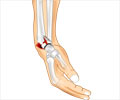Selective serotonin reuptake inhibitors, a class of anti-depressants alters bone turnover, shifting the balance in favor of bone thinning than strengthening.

For the study, the researchers focused on 137,031 women with no mental health issues and aged between 40 and 64 who started treatment with SSRIs between 1998 and 2010.
They were compared with more than 236,294 women of the same age prescribed H2 antagonists or proton pump inhibitors (PPIs), typically used to treat indigestion, over the same time-frame.
Analysis of the data showed that fracture rates were significantly higher among the women treated with SSRIs.
The fracture rate was 76 percent higher among those prescribed SSRIs one year after starting treatment, 73 percent higher after two years and 67 percent higher after five years than it was among those treated with indigestion drugs.
Anti-depressants may alter bone turnover, shifting the balance in favor of bone thinning rather than bone strengthening activities, the researchers suggested.
Advertisement
Source-IANS















